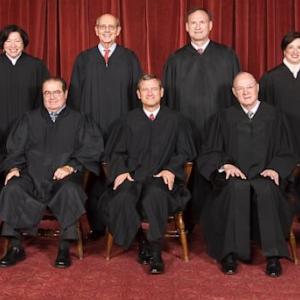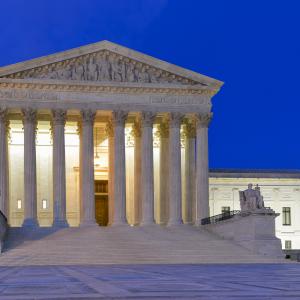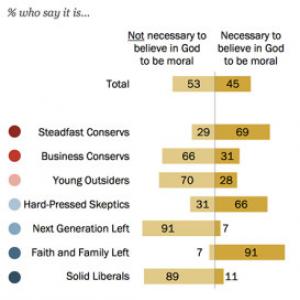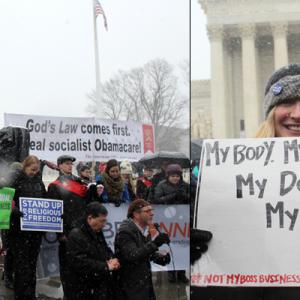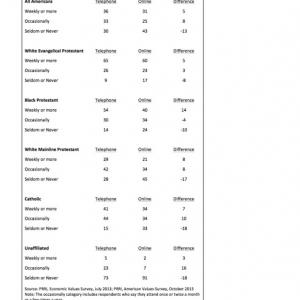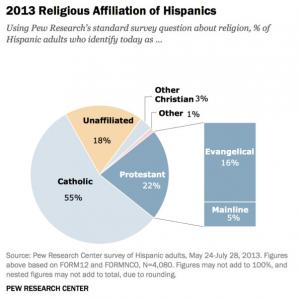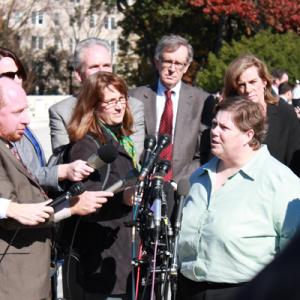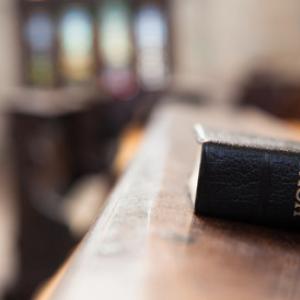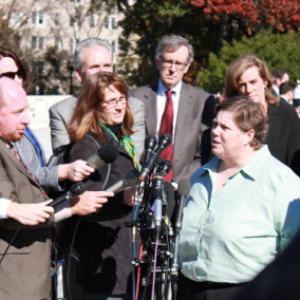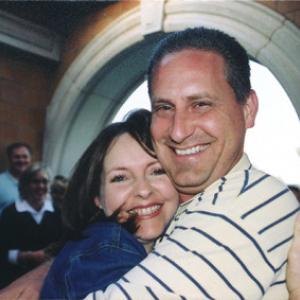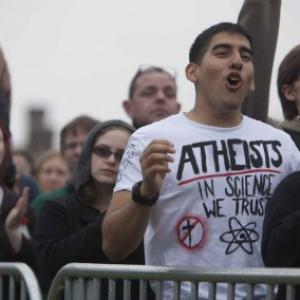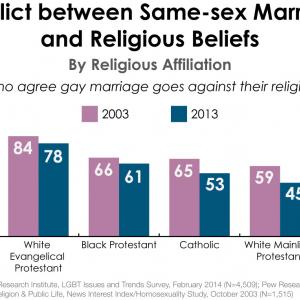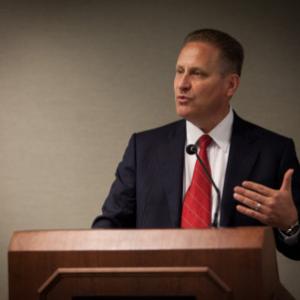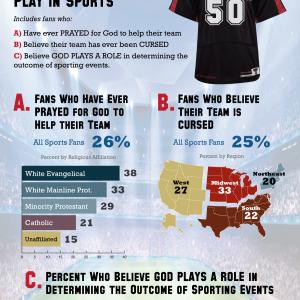Cathy Lynn Grossman is a senior national correspondent for Religion News Service, specializing in stories drawn from research and statistics on religion, spirituality, and ethics.
Posts By This Author
Five Takeaways From the Hobby Lobby Case
Five things to know about one of the most anticipated Supreme Court decisions of the year:
1. Corporations can’t pray, but they do have religious rights.
Hobby Lobby isn’t a person. It’s a chain of crafts stores owned by a religious family. And though the evangelical Green family objects to parts of the Affordable Care Act’s emergency contraception mandate, it’s not the Greens but the company that writes the check for employees’ health insurance. The first question the justices had to answer was this: Does Hobby Lobby have religious rights? To many Americans, this sounds a little nutty. Does a craft store believe in God?
A majority of the justices held that a closely held company such as Hobby Lobby does have religious rights. The court didn’t apply those rights, however, to publicly held corporations, where owners’ religious beliefs would be hard to discern.
But well before the justices had delivered their verdict on this question, many legal scholars said they wouldn’t be surprised were they to affirm the company’s religious rights. American corporations do have some of the rights and responsibilities we usually associate with people. And in the 2010Citizens United campaign finance case, the justices overturned bans on corporate political spending as a violation of freedom of speech — corporations’ free speech.
What Does the Hobby Lobby Decision Mean?
The Supreme Court on Monday sided with the evangelical owners of Hobby Lobby Stores Inc., ruling 5-4 that the arts-and-crafts chain does not have to offer insurance for types of birth control that conflict with company owners’ religious beliefs.
Beyond the specifics of the Hobby Lobby case before them, the justices broke new legal ground by affirming that corporations, not just individual Americans or religious non-profits, may claim religious rights.
Does Monday’s decision mean, however, that the religious beliefs of business owners stand paramount? That they are more important than a female employee’s right to choose from the full array of birth control methods she is promised under the Affordable Care Act? Or that a business owner may invoke his religious rights to deny service to a gay couple?
Not necessarily, legal experts say.
Forget Republican or Democrat: Americans Divide by Their Values
Toss out the party and ideology labels: Republican, Democrat, conservative, liberal.
The Pew Research Center’s new survey, “ Beyond Red VS Blue: The Political Typology,” finds no sharp lines dividing people by their views on politics, faith, family, and the role and limits of government.
“It’s a spectrum,” said Michael Dimock, vice president for research for Pew Research Center.
Looking at questions relating to faith and family, he observed, “the caricature that all religious people are Republican is just not true.”
Study: Interfaith Civic Groups Bridge Diversity with Participatory Prayers
Just because interfaith, interracial, and varied ethnic groups share a common cause doesn’t mean a diverse coalition can hang together.
It often takes prayer. And not just a “Bless this group, Amen,” invocation.
A new study by three sociologists finds that three out of four interfaith civic coalitions turn to what the sociologists have dubbed “bridging prayer” — interactive, participatory, and often innovative prayers and rituals that highlight their shared identity as people of faith.
Awaiting Supreme Court's Hobby Lobby Ruling, Public Favors Contraception Mandate
The U.S. Supreme Court is expected to finally issue its ruling this week in the highly anticipated case of the craft companies vs. Obamacare.
Technically, it’s Sebelius v. Hobby Lobby and Conestoga Wood Specialties, a showdown over the Affordable Care Act’s contraception coverage mandate. The core legal question is whether a private company can have religious rights.
But to the general public, this is seen as a showdown between employers — the evangelical Green family behind Hobby Lobby and the Mennonite Hahn familythat owns the Conestoga cabinet company — and the employees’ personal reproductive choices under their insurance.
While conservatives have cast the battle as one for religious freedom, the general public may see it as a showdown over personal health choices.
Muslim and Anti-Muslim Bus Ads Battle Heads to Round 3
A Christian, a Muslim, and a Jew turn up together on a Washington, D.C., bus.
It’s no joke. They’re the faces of a new ad campaign by the Council on American-Islamic Relations, a Muslim civil liberties group. And the ad is the latest volley between Muslim and anti-Muslim groups that has played out most recently on the sides of buses in the nation’s capital.
First, the American Muslims for Palestine ran ads during peak D.C. tourism season, the Cherry Blossom Festival in April, condemning U.S. aid to Israel.
A month later, blogger Pamela Geller’s American Freedom Defense Initiative responded with bus ads featuring photos of Hitler meeting the grand mufti of Jerusalem and a text equating opposition to Israel’s territorial policies with Nazism.
Muslim and Anti-Muslim Groups Go to War in Bus, Print Ads
A public opinion war on Middle East politics is playing out this spring in new advertising campaigns on public buses and in newspapers.
It began when the American Muslims for Palestine (AMP) launched bus ads during the April Cherry Blossom Festival condemning U.S. aid to Israel because of that country’s continuing occupation of Palestinian territories.
Then on Monday, Pamela Geller’s American Freedom Defense Initiative countered by deploying 15-foot-long ads on 20 buses in the Washington, D.C., system that equate opposition to Israel’s policies with Nazism. One ad shows the grand mufti of Jerusalem meeting Hitler during World War II.
“The bus system is considered public space, so speech has First Amendment protections,” said Caroline Laurin, a spokeswoman for the Washington Metropolitan Area Transit Authority. “We have no grounds to refuse ads due to their content.”
Poll: Americans Stretch the Truth on Attending Church
“I know what you did last Sunday,” claims the title of a new survey.
That’s according to a new survey by the Public Religion Research Institute released Saturday. The study, to be presented at the national meeting of the American Association for Public Opinion Research, was designed to measure the “social desirability bias in self-reported religious behavior.”
The survey finds that many Christians — and unbelievers, too — will exaggerate about attending worship in live phone interviews. However, when asked in an anonymous online questionnaire, people will answer more realistically.
Hispanic Catholics Differ with Evangelicals — and with the Church
The Pew Research Center’s look at “The Shifting Religious Identity of Latinos in the United States” also examined their beliefs, behavior, and views on social issues. It finds that, beyond the church doors in the lives of the faithful, there are distinct differences between Hispanic evangelicals and Hispanic Catholics:
Catholics are less likely than evangelicals to:
- Attend services weekly — Catholic, 40 percent; evangelical, 71 percent
- Pray daily — Catholic, 61 percent; evangelical, 84 percent
- Take a literal view of the Bible — Catholic, 45 percent; evangelical, 63 percent
- Think abortion should be illegal in all/most cases — Catholic, 54 percent; evangelical, 70 percent
More U.S. Latinos Shift and Drift Outside the Catholic Church
A new report on the “Shifting Religious Identity of Latinos” reads very much like a biography of Fernando Alcantar.
But once he moved to California after high school, his faith journey diverged — and derailed. Today, Alcantar, 36 calls himself a humanist.
The Pew survey report released Wednesday is subtitled: “Nearly One in Four Latinos are former Catholics.” And Alcantar is one of them.
Supreme Court Approves Sectarian Prayer at Public Meetings
The Supreme Court Monday declared that the Constitution not only allows for prayer at government meetings, but religious prayer.
“To hold that invocations must be non-sectarian would force the legislatures sponsoring prayers and the courts deciding these cases to act as supervisors and censors of religious speech,” Kennedy wrote for himself and the conservatives on the court.
Lawmakers and judges would otherwise have to police prayer, he wrote, involving “government in religious matters to a far greater degree than is the case under the town’s current practice of neither editing nor approving prayers in advance nor criticizing their contact after the fact.”
Survey: Most Americans Say Fighting Global Poverty Is Futile
Despite progress in defeating extreme global poverty, most Americans see no end in sight, according to a survey sponsored by Compassion International.
Christians who attend church at least monthly and consider religion very important in their life overwhelmingly (96 percent) expressed concern about the world’s poorest people. But they were skeptical that global poverty could be ended in the next 25 years. Only 41 percent of the group said it was possible.
And yet Scott Todd of Compassion International, the Christian nonprofit agency that sponsors 1.5 million children abroad, remains upbeat. He sees hope in the numbers of “practicing Christians” who express concern about poverty and a willingness to do more.
Bible Survey: Many Americans Scramble Their Scripture
The Bible encourages the “repression of women,” and it’s silent on such fraught topics as war or slavery.
The American Bible Society’s annual “State of the Bible” survey reveals “the people of the book are not people of this book,” said Geof Morin, chief communication officer for the society.
“We know 88 percent of people say they have a Bible. They think: ‘I have a Bible. I have had one for a long time. I must know what’s in it.’ But people overestimate their knowledge,” Morin said.
Most Voters Favor Prayer, Minus Jesus, at Public Meetings
The U.S. Supreme Court will soon rule on the constitutionality of prayer at public meetings. But a new survey finds U.S. voters clearly favor prayer – as long the public prayer is generic and not specifically Christian.
A Jew and an atheist brought suit in Greece, N.Y., saying the Christian prayers excluded many citizens and violated the Constitution, which bans government establishment of religion. Even when the town began inviting non-Christians to give invocations, the “establishment” issue remained a question.
Hobby Lobby's Steve Green Stands on Faith Against Obamacare Mandate
Once Steve Green sets his path, there’s no turning back.
Not when he saw no point in college, going directly into his family’s Hobby Lobby craft store business. Green, now 50, rose up from assembling picture frames for “bubble gum money” at age 7 through every job, including cleaning toilets, to president of the $3.3 billion national chain, one of the nation’s largest private companies.
And certainly not now when, he says, the U.S. government is challenging his unshakeable Christian faith and his religious liberty.
Behind the Numbers: Religious 'Nones' May Not Be Who You Think They Are
In recent surveys, the religious “nones” — as in, “none of the above” — appear to lead in the faith marketplace. In fact, “none” could soon be the dominant label U.S. adults pick when asked to describe their religious identity.
And, researchers say, this is already making nones’ attitudes and opinions less predictably liberal on social issues.
Survey: Americans Turn Sharply Favorable on Gay Issues
Americans’ attitudes toward the lives and choices of gays and lesbians have changed radically since Massachusetts first legalized same — sex marriage a decade ago.
A new survey finds a significant shift toward tolerance across every religious, political, and age group and every region of the country, said Robert P. Jones, CEO of the Public Religion Research Institute. PRRI’s survey, released Wednesday, reveals the ramifications of these changes in family, church, and community life.
“Only the issue of marijuana looks anything like this in terms of rapid movement in favorability,” Jones said. “But with that one exception, it’s unusual to see this much change in a relatively short amount of time.”
Science Group, Evangelicals Push New Collaboration
Scientists and Christian evangelicals can collaborate for the good of society but it will take some serious effort, experts said as they launched a new campaign to change perceptions between the two groups.
The American Association for the Advancement of Science and its Dialogue on Science, Ethics, and Religion program released a major research project on Sunday, at the AAAS annual meeting in Chicago, and announced an upcoming series of conferences mixing believers, scientists, and many who are both.
The massive survey of views on God, religion, science included 10,241 respondents and took a particularly close look at the views of evangelicals and people in science-related occupations.
What’s Abortifacient? Disputes Over Birth Control Fuel Obamacare Fight
Conception. Pregnancy. Abortion. Abortifacient.
Those words today are in a rhetorical swamp where contesting religious, medical, and political views muddy understanding. And soon the U.S. Supreme Court will wade in.
On March 25, it will hear challenges to the Affordable Care Act’s provision that employers must provide insurance coverage with no co-pays for contraception.
Fans Rely on God, Rituals to Boost Favorite Team
Most Americans don’t think God or the devil will be picking the NFL playoff winners this weekend or any other sports champions.
But some will pray nonetheless, and a few will “religiously” perform little game-day rituals just in case.
A survey by Public Religion Research Institute, released Thursday, probes the crossover between team spirit and spirituality.
Most Americans (60 percent) call themselves fans of a particular team. Among this group, several will do a little dance or say a little prayer to help the team along:
- 21 percent (including one in four football fans) will wear special clothes or do special rituals. Donning a team jersey leads the way (66 percent). But some admit they get a little funky with their underwear. One fan wears dirty undershorts on top of his jeans. (No word if these are boxers or briefs.)
- 25 percent (including 31 percent of football fans) have sometimes felt their team has been cursed. (No word on how many are Red Sox fans.)
- 26 percent (including one in three football fans) say they pray to God to help their team. White evangelicals are most likely to lean on the Lord on this: 38 percent will pray, more than any other religious group.
- Football fans are also more likely than other fans to admit praying for their team (33 percent to 21 percent), performing pre-game or game-time rituals (25 percent to 18 percent), or to believe that their team has been cursed (31 percent to 18 percent).
